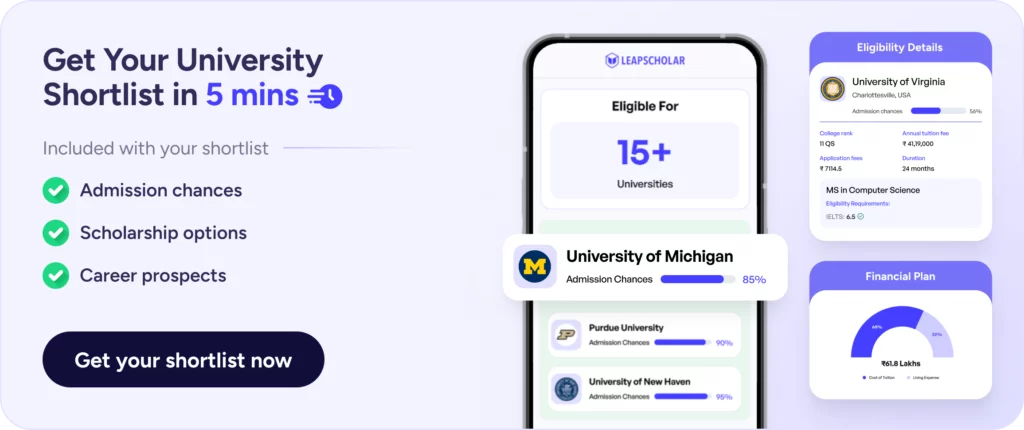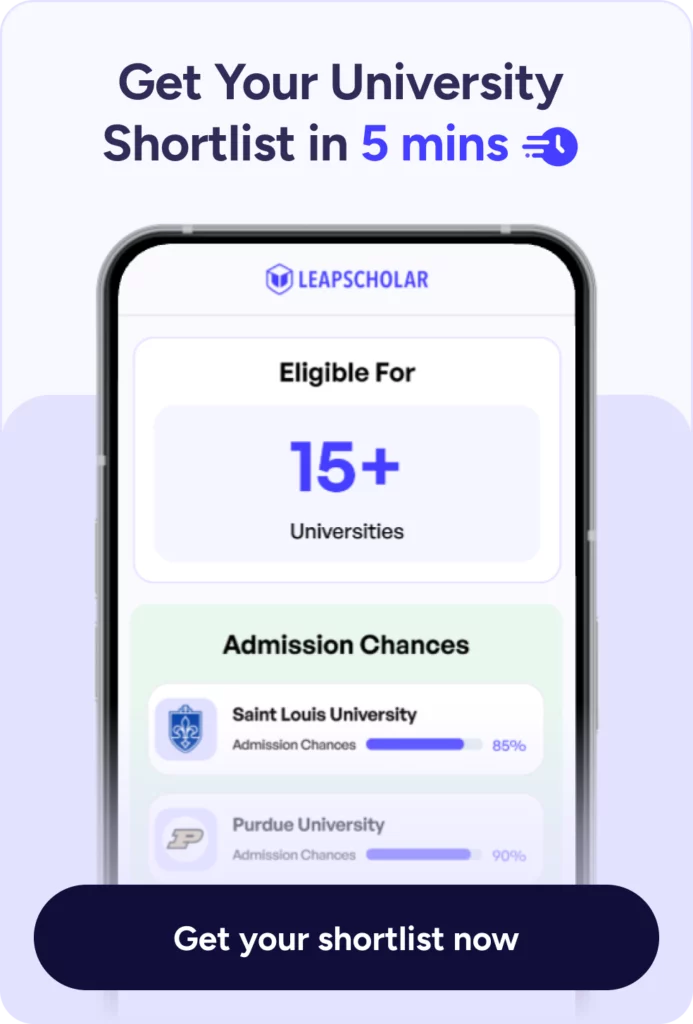
Which country do you want to study in?
Please select an option
Do you have a valid passport?
Please select an option
When do you want to study abroad?
Please select an option
What’s your preferred program?
Please select an option
What’s your highest level of education?
Please select an option
What is your IELTS/PTE/Duolingo Status?
Please select an option
Please Enter a Valid
Number
Planning to study in the UK as an Indian student in 2025? More than 1.1L Indian students are already pursuing higher education in the UK, and you can be one of them! And India is the biggest source of foreign students in the country.
But recent policy reforms have increased the visa costs to INR 60K, even with all this UK still is one of the most preferred by Indian students because of the quality of life, top universities and a welcoming and lively student support.
In this blog, we will talk about the latest information and useful tips to assist you with the UK student visa application process confidently and avoid potential pitfalls.
Step-by-Step UK Student Visa Application Process
As you prepare your study journey to the UK, it’s important to initiate the process of applying for a visa early. This will give you sufficient time to collect the required documents and deal with any possible delays that can occur.
Let’s look at the details of the UK student visa application process:
When and Where to Apply?
Begin your application process no less than 6 months prior to your course commencing. You will need to apply online through the official UK website, on the visa page, and provide your biometrics at a VFS centre in India.
- Apply as soon as possible after you obtain your CAS (Confirmation of Acceptance for Studies).
- Processing of the visa usually starts 6 months prior to the commencement of your course.
- Biometrics and document submission happen at VFS Global centres in cities like Delhi, Mumbai, Chennai, etc.




Required Documents Checklist
Keep your documents ready and organised to avoid delays. Here’s what you’ll typically need:
- A valid passport (with at least 6 months’ validity)
- CAS letter from a UK university
- Academic transcripts and certificates
- English language test results (IELTS/PTE/TOEFL)
- Financial proof (bank statement, education loan, etc.)
- Tuberculosis test certificate (if required)
- ATAS certificate (for specific courses)
- Print several copies and label folders neatly, it saves time at every step.
Visa Interview Preparation (If Necessary)
The majority of Indian applicants will not be required to go through a visa interview, but it may be required in exceptional cases.
- You might receive an invitation for a credibility interview by email.
- Questions are about your course, funding, and future plans.
- Be truthful, assertive, and ensure your answers align with your application.
What is a UK Student Visa?
The Student Route (formerly Tier 4) visa is the main long-term visa for international students in the UK.
- It enables you to study full-time at a UK-licensed university
- You can also work part-time (max 20 hours per week) during the term
- Lasts throughout your course + additional time depending on the length of the course
Types of UK Student Visas (Tier 4 & Short-Term Study Visa)
There are two major types of student visas you might apply for:
- Student Route Visa (Tier 4): For courses longer than 6 months
- Short-Term Study Visa: For English language courses up to 11 months
Most degree courses use the Student Route.
Latest Updates & Policy Changes (Post-Brexit & 2024-25 Changes)
Some important changes have come into effect recently, so let’s look at the UK student visa new rules:
- As of January 2025, dependents are only allowed for postgraduate research students
- The Graduate Route visa remains unchanged for post-study work.
- Student visa holders must show a genuine intent to study and fund themselves.
UK Student Visa Requirements 2025
For a UK student visa, you need academic marks and accepted English proficiency tests to adequate financial evidence and valid documents; each bit of information has to be precise and timely.
Let’s look at the details of UK student visa requirements:
Academic & Language Requirements
For UK student visa requirements, you may need an admission letter from a recognised university in the UK, and in order to do that, you may need:
- The Minimum academic score is approximately 60% for the majority of undergraduate and postgraduate taught programmes, particularly arts, commerce, and humanities streams.
- For STEM programmes, competitive institutions might require 70% or above in the main subjects. High-class institutions could have programme-specific requirements or entrance tests.
(Please note that these are general requirements based on the experience of the students sent by Leap.)
Also Read: Study in the UK Without IELTS [Top 10+ Universities]
Financial Requirements (Bank Balance, Blocked Account)
You must prove you can support yourself financially in the UK.
- Tuition fees (1 year or full if the course < 1 year): vary by university
- Living costs:
- London: £13,134/year (INR 13,80,000)
- Outside London: £9,207/year (INR 9,70,000)
- Funds must be held for at least 28 consecutive days before application
CAS Letter & Sponsorship
The CAS (Confirmation of Acceptance for Studies) letter is issued by your university after accepting your offer.
- Includes details of your course, fees paid, and sponsor license number
- Without CAS, you cannot apply for a visa
- Double-check all information on the CAS for accuracy
UK Student Visa Processing Time & Fees
The UK Home Office usually processes applications for UK student visas within 3 weeks. In the periods of peak demand (July-September), the processing time is up to 8-10 weeks.
Budgeting your time and funds correctly ensures you do not have last-minute stress, particularly visa fees and health surcharges. Advancing planning on these expenses prevents delays and ensures financial documents show correct, adequate funds when applying.
Let’s look at the details of UK visa processing time:
UK Student Visa Fees
According to the official UK website, the UK student visa fees for 2025:
- Student visa fees: £524 (INR 60K)
- Immigration Health Surcharge (IHS): £776/year (INR 88K)
UK Visa Processing Time for India
Expect quick turnarounds if you apply early.
- Standard processing: 3 weeks
- Peak season (July-Sept): Can take 8-10 weeks
- Always apply at least 28 days before your course starts
Priority & Super Priority Services
If you’re in a rush, consider these premium services:
- Priority Visa: £509 extra (INR 58K), 5-day processing
- Super Priority Visa: £1018 extra (INR 1.1L), 24-hour processing
- Ideal for last-minute cases or scholarship delays
Financial Proof & Bank Statements for UK Student Visa
One of the most challenging aspects for Indian students is financial proof, but don’t panic, it’s doable if done properly. UK Visas and Immigration has issued detailed rules for financial evidence for the Student Route from January 2025 onwards.
You will need to demonstrate sufficient funds to cover:
- 1 year’s tuition fee (as listed on your CAS)
- Living expenses:
- London: £1,483/month for up to 9 months = £12,006 (INR 15L)
- Outside London: £1,136/month for up to 9 months = £9,207 (INR 11L)
For each dependent:
- London: £845/month (up to 9 months)
- Outside London: £680/month (up to 9 months)
Hey, but don’t worry, you can be exempted from submitting financial proof, only if:
- You’ve lived in the UK for over 12 months on a valid visa
- You are a Student Union Sabbatical Officer or a doctor/dentist in training
Acceptable Financial Sponsors & Account Types
There are many acceptable sponsors for you to fund your studies. Let’s look at some of them:
- Your bank account must allow immediate access to your funds.
- Parent’s or partner’s account can be presented with a consent letter and proof of relationship.
- Official financial sponsorship, for example, if you have a grant or scholarship.
- Approved education loans (must be from a government or regulated source)
However, you cannot use the following methods:
- Overdrafts
- Cryptocurrency accounts
- Stocks, shares, or pensions
- Unregulated or cash-based bank accounts
- Accounts not using electronic record-keeping
- Personal bank accounts (student or parent)
- Fixed deposits (with maturity flexibility)
- Approved education loans (from RBI-recognised banks)
Unacceptable: PPF, mutual funds, salary slips, non-liquid investments
UK Student Visa Rejection Reasons & How to Avoid Them
In the previous few years, India witnessed a decline of 5% in student visa issuance, down to less than 103,000 visas issued from January to September. These rejections and cuts can normally be prevented with proper documentation and timely preparation. Even excellent students get declined for minor mistakes.
Let’s learn to steer clear of them:
Common Application Mistakes
- Incorrect or mismatched details
- Mistakes in submitting expired or incorrect formats
- Disregard of the 28-day rule for funds
- Booking a visa appointment too near the start date
- Incomplete CAS or English test evidence
Financial & Document-Related Rejections
- Insufficient bank balance
- Sponsors were not properly explained.
- Fund source untraceable (cash deposits)
- Always avoid using unverified documents.
Appeal or Reapply – What to Do Next?
- When rejected, read the refusal letter carefully and comprehend the precise reason.
- Deal with the highlighted issue, whether financial evidence, paperwork, or credibility issues.
- Have revised paperwork ready and reapply at your earliest convenience (no waiting period unless required)
- If you’ve left something trivial (such as a date discrepancy or a single document), state it clearly in a cover letter.
- If unsure, seek an immigration specialist or the university’s international office before reapplying.
Summing Up
It might look intimidating to apply for a UK student visa initially. Still, by having a clear checklist, sound financial documents, and a well-charted schedule, Indian students can sail through the process. From shortlisting the university to getting your CAS done and obtaining bank statements, each point counts for visa success.
If you’re unsure about particular requirements, such as demonstrating 28-day funds, the amount of living cost to cover, or the right format for a bank letter, getting advice early on can prevent rejection. More than 95% of Indian students presenting a full and correct application get their visas granted, and you can be one of them!
Start your UK Journey with LeapScholar today!
Frequently Asked Questions
-
Q. What are the requirements for a student visa in the UK?
A. You need a valid passport, CAS letter (issued by your university after accepting your offer), financial proof, English proficiency test scores, and sometimes a TB test. Your documents must match your university offer and visa application details.
-
Q. How can I get a UK student visa?
A. After receiving your CAS (issued by your university after accepting your offer) from a licensed UK university, apply online at the official student visa website, pay the visa and IHS fees, submit biometrics, upload your documents, and await your decision.
-
Q. Is a UK student visa easy to get?
A. Yes, if you meet all academic, financial, and document requirements. The UK has a high visa success rate for Indian students who apply correctly and provide authentic, complete information.
-
Q. How much will a UK student visa cost?
A. The visa fee is £524 (INR 60K) and the Immigration Health Surcharge (IHS) is £776/year (INR 88K). In addition, you’ll need to show proof of funds for tuition and living expenses separately, ranging from INR 18-28 lakhs, depending on your university. Always check the latest exchange rates & keep funds slightly above the minimum to account for fluctuations.



